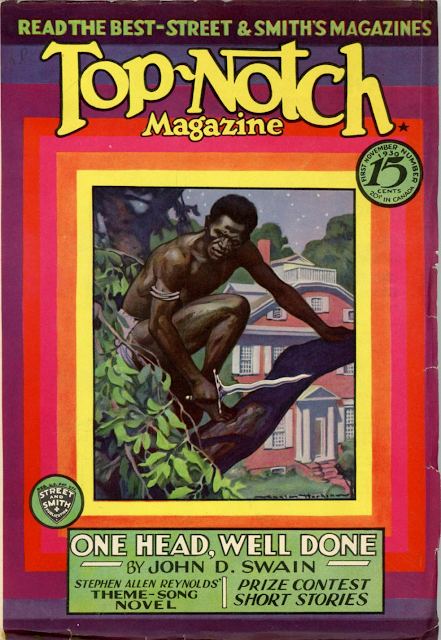Another in the series of posts on O’Henry award winning stories from pulp magazines. This is the one that started me thinking about doing the series. John D. Swain’s One Head, Well Done in the , November 1, 1930 issue of Top-Notch Magazine won the O’Henry award in 1931. It was a lucky win, since Wilbur Daniel Steele’s Can’t cross Jordan by myself was adjudged best story, but was not awarded as Steele had already won the award thrice. Which is not to deny the merits of Swain’s story.
 |
| Top-Notch Magazine, November 1, 1930 cover by Gayle Hoskins featuring John D. Swain’s story One Head, Well Done
|
Swain’s diction is charmingly archaic. He introduces us to the Reverend Peter Vedder, a missionary gentleman who has returned from his foreign mission to his ancestral manse, accompanied by a valet from Borneo.
“It is the ancestral estate of the Vedders; and the Reverend Peter Vedder, a retired missionary, the last of his line, save for some nieces and nephews, had for the past four or five years lived here, in company with a great array of solemn-faced, or pink and jolly, ancestral portraits, some unusual early colonial furniture and silver, a few servants, and his memories of strange adventures in many lands.
Often, in steaming jungle or entrancing isle, or on some bleak plateau of a colder clime, he had closed his eves to rest upon the vision of this, his home until he graduated from college and then from the seminary. For long years it had heartened him in the performance of heroic or fatiguing labors.”
After returning, Vedder takes in the changes – physical and moral – that have taken place in his native town after his departure. He starts crusading against crime and corruption, and starts to upset powerful people.
“He girded up his loins for battle and presently became a thorn in the flesh of certain influential parties. He was too important to be ignored; his reputation was more than local, and great men visited him from time to time. He had what the Kemper bosses termed “pull,” but what was really character, recognized by important state and national officials. He could get things done; make investigations function. When one of his fiery articles was too hot for the local press to dare use, he would have it printed at his own expense on dodgers, and circulated where it would do the most damage. He bought whole pages of newspaper advertising for his campaigns for decency. Not afraid to call names out loud, he made a great many furtive gentlemen exceedingly uncomfortable. He became, in short, a nuisance.”
A group of criminals meets and decides to rid themselves of this meddlesome priest.
“It was evident that the united opinion of all present was that Peter Vedder must go. He must be given the works; taken for a ride. Blotted out, in short. So that it was a mere formality when, everybody having exercised his full rights of free speech, Gory spoke, with the half grin, half snarl that characterized him in his moments of lighter humor.
“All those in favor—” he grunted. “Cont’ry minded? It’s a vote! Le’s have another li’l drink, boys.”
A simple meeting, free from malice. If there had been no disposition to glorify the missionary’s record, there was likewise none to indulge in any expression of hatred. He was in their way; a nuisance. In a strictly business proposition, he was a matter of useless overhead, and as such, the city of Kemper ought not to have to carry him any longer.”
 |
| One Head, Well Done by John D. Swain interior illustration by Rafael de Soto |
The assassination is attempted; Vedder is shot and wounded, though not fatally. The valet witnesses the attack and sees the attackers clearly enough to be able to identify them in future. He recognizes that he cannot attack men armed with guns, so he waits patiently till the attackers withdraw and gets medical help for Vedder.
He decides to avenge Vedder, and goes seeking the criminals. He comes upon one, and beheads him with a knife. If this were all, this would be a routine story not worth talking about. As it is, it takes an interesting turn from here.
The story ends with a report of increased attendance at a local museum, and notes that the local people are at last starting to take advantage of the learning opportunities offered them. What those learning opportunities are, read the story to find out.
You can read the story here:
Enjoy and let me know what you think of the story in the comments.

